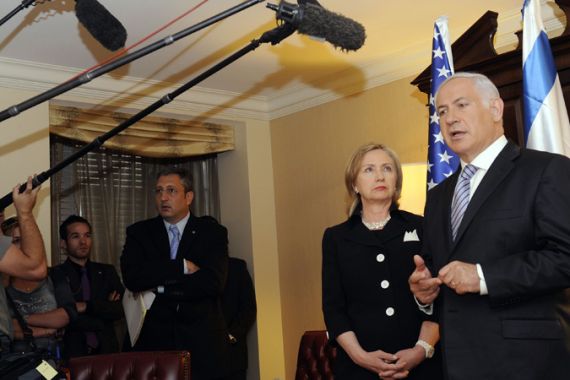Killing time no more
A concrete decision on the future of Palestinian statehood should be made within the next 12 months.

 |
| An ambitious timetable for progress is no guarantee for a solution [Getty Images] |
After months of diplomatic arm twisting and cajoling, the US government announced on August 20 that direct Israeli-Palestinian negotiations would resume on September 2, as they now have.
In making this announcement, Secretary of State Hillary Clinton stated that this new round of negotiations should be “without preconditions,” as Israeli Prime Minister Binyamin Netanyahu has insisted all alone. However, she also stated that both Mr. Netanyahu and PLO Chairman Mahmoud Abbas have agreed that the negotiations should be subject to a one-year time limit, against Netanyahu’s preference.
Almost 17 years after the “Oslo Declaration of Principles”, with its five-year deadline for reaching a permanent status agreement, was euphorically signed on the White House lawn, why should anyone take this new deadline seriously or see any reason for hope in it?
Throughout the long years of the perpetual “peace process”, deadlines have been consistently and predictably missed. Such failures have been facilitated by the practical reality that, for Israel, failure has had no consequences other than a continuation of the status quo, which, for all Israeli governments, has been not only tolerable but preferable to any realistically realisable alternative.
In everyone’s interests, this must change. For there to be any chance of success in the new round of negotiations, failure must have clear and compelling consequences which Israelis would find unappealing.
In an interview published on November 29, 2007, in the Israeli daily Ha’aretz, Mr. Netanyahu’s predecessor, Ehud Olmert, declared: “If the day comes when the two-state solution collapses, and we face a South African-style struggle for equal voting rights (also for the Palestinians in the territories),
then, as soon as that happens, the State of Israel is finished.”
All that the Palestinian leadership needs to do in order to enter this new round of negotiations in a position of strength is to state promptly that, if a definitive peace agreement on a two-state basis has not been reached and signed by the agreed deadline of September 2nd next year, the Palestinian people will thereafter have no choice but to seek justice and freedom through democracy — through full rights of citizenship in a single state in all of Israel/Palestine, free of any discrimination based on race or religion and with equal rights for all who live there — and that they would pursue this goal through purely nonviolent means.
The Arab League should then publicly state that the very generous Arab Peace Initiative, which, since March 2002, has offered Israel permanent peace and normal diplomatic and economic relations with all Arab countries in return for Israel’s compliance with international law, will be “off the table” if a definitive Israeli-Palestinian peace agreement has not been signed by the deadline.
Framing the choice before Israelis with such clarity would ensure that the Israeli leadership would, at last, be inspired — indeed, compelled — to make the most attractive two-state offer to the Palestinians which Israeli public opinion could conceivably find acceptable.
It is even possible that, if forced to focus during the coming year on the prospect of living in a single democratic state with equal rights for all its citizens– which, after all, is what the United States and the European Union hold up, in all other instances, as the ideal form of political life — many Israelis might
come to view this “threat” as less nightmarish than they traditionally have.
In this context, Jewish Israelis might wish to talk with some white South Africans. The transformation of South Africa’s racial-supremacist ideology and political system into a fully democratic one has transformed them, personally, from pariahs into people welcomed throughout their region and the world.
This latest one-year deadline for achieving an agreed settlement of the Israeli-Palestinian conflict must be meaningful. It must have clear consequences.
Whether the future of the Holy Land is to be based on partition into two states or on full democracy in one state, a definitive choice must be made in the coming year. A fraudulent “peace process” designed simply to kill time can no longer be tolerated.